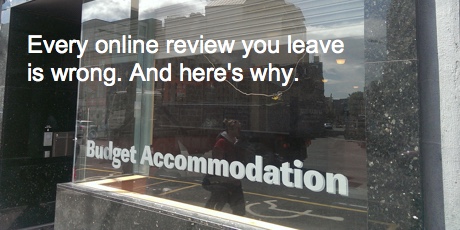Every online review you leave is wrong. And here's why.
This is what is wrong with every online review: people who leave 7/10 reviews when they are fully satisfied, don’t buy from companies who get 7/10 reviews.
It’s not intentional, we simply don’t understand our role: while we thought we were taking part in a customer feedback exercise, we just became the head of HR.
For the minute it took to write my review, I was nothing short of the CEO. And therein lies the problem.
My Holiday Review
I recently returned from my holiday completely satisfied. Although I left my verbal and financial gratuities, my role in the supplier:client relationship was not over on departure.
Within days of returning home I was chased by email and then by text, for my review. I obliged, scoring every question highly, sharing what I believed to be ample praise from a now otherwise busy, but certainly contented consumer.
Nothing had wowed me, it wouldn’t, I travel a lot.
Weeks later, intrigued by the nagging persistence of the online review process (one box amongst many was left unchecked), I made a point to contact and ask someone who actually served me, what was the impact, if any, of my scores.
The bottom line? The review that I thought gave ample praise, would in reality threaten their job. Their megabrand employer wasn’t asking “what can we do better” rather, “can these people keep their jobs?”
The target, at least on this cruise line, was a 95% score, ongoing, or else. And my review was not that.
Everyone's a Critic and a CEO
Social networks and ecommerce collide on the pages of TripAdvisor, Yelp, eBay and Amazon. Not only is each reviewer a professional critic, they’re also CEO. Frankly, we’re just not trained for the job.
We not only judge what we have received against the description offered but go beyond this, acting as a judge of someone’s business as a whole. Our reviews are often used as threats, or demands to “do better for the next guy”.
Studying (albeit on a very informal level) the reviewing behaviour of friends, it was interesting that I could tell them apart from the “anonymous” words they provided.
The Brits were keen to point out individuals who had served them well but were generally harsh to big brands. Hoteliers were blamed for the crowds in cities. Airlines whipped for delays on runways.
Americans, I found, left more reviews but had expectations of even base-level service that my local Travelodge or Wetherspoons would find impossible to meet.
One elderly friend always leaves no greater than 5/10 or 50% claiming,
“there’s always something they can do better”
I hope she’s not right.
Some of us genuinely believe there is an opportunity to improve the service industries we pay for. Others want to demonstrate (to their peers at least) that they have standards greater than those they have experienced.
Our reviews say more about who we are, than how pleased we have been.
And that brings us back to this revelation, “people who leave 7/10 reviews when they are fully satisfied, will not buy from companies scoring an average of 7/10”
More Than Satisfied
So, we want to be more-than-satisfied on every occasion.
In what world can that work? And who could possibly gain? You do the math, but I think it leads to mismatch of expectation when anything becomes popular. Based on the anticipation of service and its delivery, all who are trendy are destined to fail.
A decade ago, grumbling holidaymakers would have probably met a holiday rep in situ. If not, they would have walked into Thomas Cook and discussed their issue in person.
The process was one of negotiable but containable rage. Today, the recipient of our disgruntled review is the end provider, hotel, restaurant, airline or host.
Chances are they didn’t interact, advertise or profile us before arrival. The facilitators, the travel comparison sites for example dominate the bookings. The actual service providers rarely even know what we paid.
It’s undeniably true that the ads on our biggest search engine get many more clicks when show they ratings and it’s proven that hotels fill rooms when they rise in lists. Even if you didn’t find your supplier via Google or your hotel through TripAdvisor, they probably couldn’t survive without those who did.
Reimagining Review Systems
I don’t have an answer (yet), but it occurs to me that individual reviews (much like the profiles of people) should have the benefit of additional edits over time. My own perception of my trip varied within hours. Firstly, the hellishly taxi ride home, then, on reflection, the wonderful time I’d had.
If I’m a 7/10 Brit and you’re an 8/10 Yanky, nudge up my numbers when you read my scores. We’d probably both enjoy the same souffle.
At the very least, when designing review systems, the social negotiation that’s taking place must be considered. Little of the review content actually measures standards, almost everything is for the writer’s own sense of brand. Their personal brand. Judge that and make compensations for it, there’s enough data available on both sides to create an algorithm.
Even if we don’t rebuild TripAdvisor or throw away our Amazon stars, we should at least be told what ‘feedback’ actually means before we provide it. In some cases it’s a marketing thing to make us feel heard. In others, it’s a direct question that impacts someone’s pay.
What Type of Reviewer Are You?
And if we are being asked to be the CEO or MD for the day, we need to ask ourselves this...are we the type of people we’d do business with anyway?
In my brief study there appeared to be five “types” of citizen reviewer by personality profile. Which one are you?
- The "temporary CEO"
- The "on behalf of the next guy"
- The "seeking revenge"
- The "humble friend"
- The "in the know"
Photo (cc) Northside Dereliction on Flickr.



